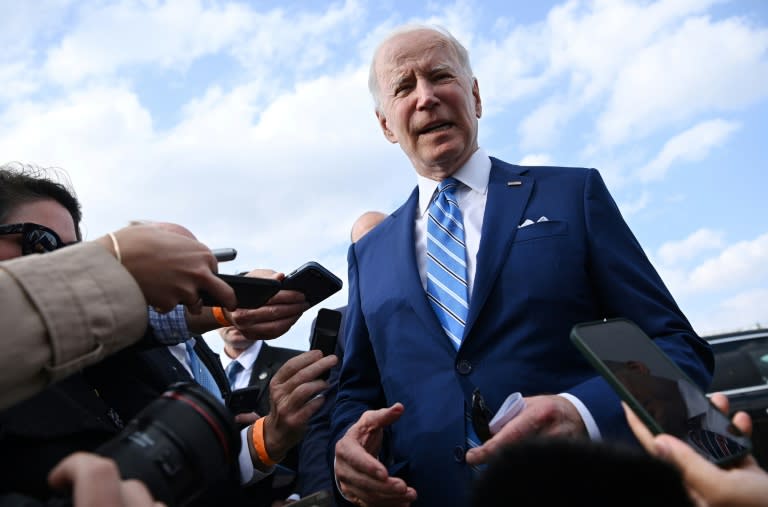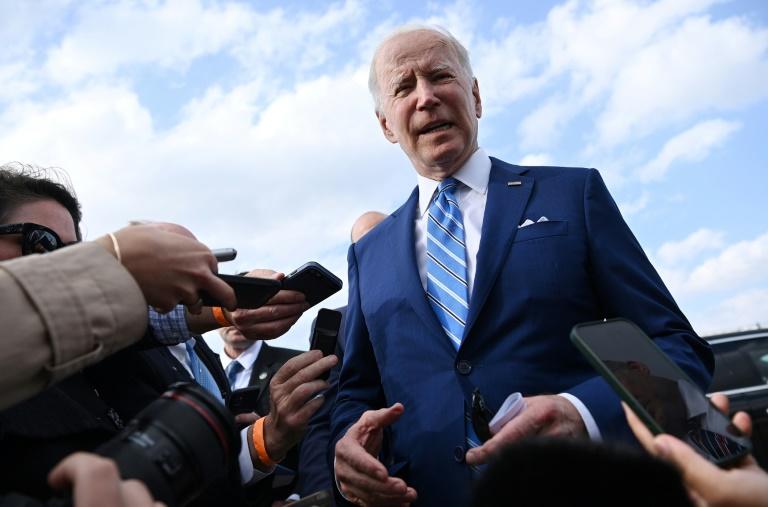
A “war criminal” and “butcher” who “cannot remain in power”: over recent weeks, US President Joe Biden has made a series of unscripted remarks that have raised the temperature in his relations with Russian leader Vladimir Putin.
But Biden’s ad-libbed line during what was billed as a speech on biofuels and helping Americans with the cost of living in Iowa Tuesday may have cut the deepest.
Going further than any top administration official had, Biden characterized Russian attacks on Ukrainian civilians for the first time as “genocide,” a heavily-loaded term that both he and the administration had been avoiding.
The White House, as it had in the past, anticipated having to clean up the remark later and prepped journalists behind the scenes that a clarification would be coming — but, notably, none has.
Instead, asked later by journalists if he’d meant what he said, Biden doubled down.
“Yes, I called it genocide,” said the president, adding that he’d let lawyers decide “whether or not it qualifies” as such.
“It’s become clearer and clearer that Putin is just trying to wipe out the idea of even being able to be a Ukrainian.”
AFP asked the US State Department if it had come to the same conclusion formally — that a genocide was being perpetrated in Ukraine — but officials refused to offer a firm position.
Russian forces are accused of indiscriminate killings of Ukrainian civilians in the town of Bucha, on the outskirts of the capital Kyiv.
On Wednesday the Kremlin hit back at Biden’s comment, calling it “hardly acceptable for the president of the United States” to “attempt to distort the situation in this way.”
The “genocide” remark came amid unconfirmed reports of Moscow using chemical agents that has left the White House scrambling to formulate an appropriate response.
– ‘True leader’ –
Ukrainian President Volodymyr Zelensky was in no doubt what Biden’s words signified.
“True words of a true leader… Calling things by their names is essential to stand up to evil,” he tweeted.
White House officials have been more fastidious than the boss in staking out carefully-worded responses to each new development in the conflict — yet Biden has repeatedly undone their work with his spontaneous rhetorical attacks going beyond the administration’s line.
Last week, he called reports of Russian atrocities in Ukraine a “war crime” but resisted using the term genocide.
He also called Putin a “war criminal” following Zelensky’s highly-charged appeal to the US Congress for help last month, only to have his officials try to soften the remark later.
White House staffers were similarly aghast 10 days later when Biden said in Poland that Putin was a “butcher” who “cannot remain in power.”
The White House sprang immediately into action, clarifying within minutes that Biden was not advocating “regime change” in Russia.
But Biden largely stood by his words, saying the comments were not a policy change but expressed his “moral outrage.”
The president has been criticized on each occasion but the frequency of the controversies might suggest that he is leading rather following — dragging more cautious aides into a tougher stance against Russia.
And while Secretary of State Antony Blinken and National Security Advisor Jake Sullivan have declined to use the word, Biden is sure to have pleased hawks from both parties on Capitol Hill, who have been pressuring the White House to offer a more strident response.
– ‘It’s madness’ –
“It is a genocide,” Chuck Schumer, the leader of Biden’s Democratic Party in the Senate, said on April 6.
“When these people are shot simply because of their nationality, they don’t have arms, that’s genocide — especially when it occurs in the large numbers it has already.”
Other leaders in the Western alliance have been more reserved.
French President Emmanuel Macron criticized the use of the term “butcher” and has refused to follow Biden in using the term “genocide.”
“It’s madness what’s happening, it’s incredibly brutal,” he said.
“But at the same time I look at the facts and I want to try as much as possible to continue to be able to stop this war and to rebuild peace. I’m not sure that verbal escalations serve this cause.”
A European diplomat agreed, telling AFP Biden was trying to thread the needle of speaking in terms that would be sufficiently robust to satisfy Congress while avoiding harming the pursuit of a negotiated settlement.
The president is reportedly preparing to authorize another $750 million in weapons for Ukraine as early as Wednesday as it faces a revamped Russian offensive in the Donbas region.
But he has ruled out sending troops to Ukraine or getting involved in the conflict by any other means, meaning the only option still on the table for attack Putin is the occasional verbal broadside.
aue/ft/st




